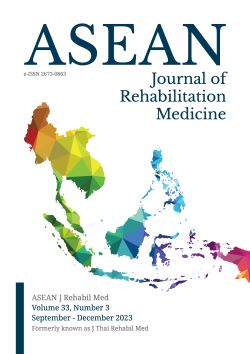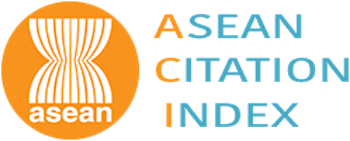Construct Validity and Internal Consistency Reliability of the Thai Version of the Telephone-Based Cognitive Screening Tool
Keywords:
cognitive screening, telephone survey, interviews, exploratory factor analysisAbstract
Objectives: To affirm the construct validity and internal consistency reliability of the Thai version of the Telephone-Based Cognitive Screening Tool (Thai-TeBCOG).
Study design: A cross-sectional study.
Setting: Health-promoting hospitals, elderly schools in Bangkok, Chiang Mai, Khon Kaen, Chon Buri, and Nakhon Si Thammarat, Thailand.
Subjects: Participants of the study were 225 healthy adult volunteers between the ages of 23 and 80 and were from Thailand’s city of Bangkok and provinces of Chiang Mai, Khon Kaen, Chon Buri, and Nakhon Si Thammarat. The volunteers were evaluated and assessed to be free of dementia, cognitive impairment, and depression.
Methods: Participants’ demographics and information were gathered using a number of instruments and two main procedures. Firstly, items on the screening instruments were addressed through face-to-face interviews lasting on average approximately 15 minutes. Secondly, the Thai-TeBCOG was administered remotely over the phone for about 20 minutes. Cronbach’s alpha was used to measure internal consistency, and exploratory factor analysis (EFA) was applied in assessing the questionnaire’s construct validity.
Results: There were 13 items on the Thai version of the Telephone-Based Cognitive Screening Tool. The internal consistency and the construct validity of the screening tool were examined by using Cronbach’s alpha coefficient and exploratory factor analysis, respectively. The results showed that the Thai-TeBCOG’s internal consistency was acceptable with a Cronbach’s alpha of 0.75. The construct validity of the tool was evaluated using EFA, and four extracted factors accounted for 54.48% of the total variance.
Conclusions: Four domains of individual differences were investigated. This study contributes to a growing body of knowledge aimed at increasing the effectiveness of cognitive screening tools for adults in different contexts.
References
Bliddal S, Banasik K, Pedersen OB, Nissen J, Cantwell L, Schwinn M, et al. Acute and persistent symptoms in non-hospitalized PCR-confirmed COVID-19 patients. Sci Rep [Internet]. 2021 Jun [cited 2022 Mar 20];11(1):13153. Available from: https://www.nature.com/articles/s41598-021-92045-x/ doi.org/10.1038/s41598-021-92045-x
Ritchie K, Chan D. The emergence of cognitive COVID. World Psychiatry [Internet]. 2021 Feb [cited 2022 Mar 10];20(1):52. Available from: https://onlinelibrary.wiley.com/doi/10.1002/wps.20837
Ciemins EL, Holloway B, Jay Coon P, McClosky-Armstrong T, Min S-j. Telemedicine and the Mini-Mental State Examination: Assessment from a Distance. Telemed J E Health [Internet]. 2009 Jun [cited 2022 Feb 14];15(5):476-8. Available from: https://www.liebertpub.com/doi/10.1089/tmj.2008. 0144
Hemrungrojn S. Montreal cognitive assessment (MOCA) Thai version 2007; 2011 [cited 2019 July 1]. Available from: https://mocacognition.com/paper/
Tanglakmankhong K, Hampstead BM, Ploutz-Snyder RJ, Potempa K. Cognitive screening assessment in Thai older adults: a prospective study of the reliability and validity of the Abbreviated Mental Test. J Health Res [Internet]. 2022 Jan [cited 2022 Jan 14];36(1):99-109. Available from: https://www.emerald.com/insight/content/doi/10.1108/JHR-02-2020-0049/full/html
Chaaya M, Phung T, El Asmar K, Atweh S, Ghusn H, Khoury R, et al. Validation of the Arabic Rowland Universal Dementia Assessment Scale (A-RUDAS) in elderly with mild and moderate dementia. Aging Ment Health [Internet]. 2016 Aug [cited 2022 Jan 25];20(8):880-7. Available from: https://www.tandfonline.com/doi/full/10.1080/13607863.2015.1043620
Castanho T, Amorim L, Zihl J, Palha J, Sousa N, Santos N. Telephone-based screening tools for mild cognitive impairment and dementia in aging studies: a review of validated instruments. Front Aging Neurosci [Internet]. 2014 Feb [cited 2022 Apr 24];6:16. Available from: https://www.frontiersin.org/articles/10.3389/fnagi.2014.00016/full/ doi.org/10.3389/fnagi.2014.00016
Larner AJ. Neuropsychological neurology: the neurocognitive impairments of neurological disorders: New York: Cambridge University Press; 2013.
Harvey PD. Domains of cognition and their assessment. Dialogues Clin Neurosci [Internet]. 2022 Apr [cited 2023 Mar 10];21(3):227-37. Available from: https://www.tandfonline.com/doi/full/10.31887/DCNS.2019.21.3/pharvey/ doi.org/10.31887/DCNS. 2019.21.3/pharvey
Raz N, Rodrigue KM. Differential aging of the brain: Patterns, cognitive correlates and modifiers. Neurosci Biobehav Rev [Internet]. 2006 Jan [cited 2023 Mar 10];30(6):730-48. Available from: https://www.sciencedirect.com/science/article/abs/pii/S0149763406000704?via%3Dihub/ doi.org/10.1016/j.neubiorev.2006.07.001
Zanto TP, Gazzaley A. Aging of the frontal lobe. In: D’Esposito M, Grafman JH, editors. Handbook of clinical neurology. Netherlands: Elsevier; 2019. p. 369-89.
Miyake A, Friedman NP, Emerson MJ, Witzki AH, Howerter A, Wager TD. The unity and diversity of executive functions and their contributions to complex “frontal lobe” tasks: A latent variable analysis. Cogn Psychol [Internet]. 2000 Aug [cited 2022 Apr 19];41(1):49-100. Available from: https://www.sciencedirect.com/science/article/abs/pii/S001002859990734X?via%3Dihub/ doi.org/10.1006/cogp.1999.0734
Lacreuse A, Raz N, Schmidtke D, Hopkins WD, Herndon JG. Age-related decline in executive function as a hallmark of cognitive ageing in primates: an overview of cognitive and neurobiological studies. Phil. Trans. R. Soc. B [Internet]. 2020 Nov [cited 2022 Apr 19];375(1811):20190618. Available from: https://royalsocietypublishing.org/doi/10.1098/rstb.2019.0618
O’Keeffe E, Mukhtar O, T O’Keeffe S. Orientation to time as a guide to the presence and severity of cognitive impairment in older hospital patients. J Neurol Neurosurg Psychiatry [Internet]. 2011 May [cited 2022 Apr 28];82(5):500-4. Available from: https://jnnp.bmj.com/content/82/5/500
Nasreddine ZS, Phillips NA, Bédirian V, Charbonneau S, Whitehead V, Collin I, et al. The Montreal Cognitive Assessment, MoCA: a brief screening tool for mild cognitive impairment. J Am Geriatr Soc. 2005 Apr [cited 2022 Apr 28];53(4):695-9. Available from: https://agsjournals.onlinelibrary.wiley.com/doi/10.1111/j.1532-5415.2005.53221.x
Storey JE, Rowland JTJ, Conforti DA, Dickson HG. The Rowland Universal Dementia Assessment Scale (RUDAS): a multicultural cognitive assessment scale. Int Psychogeriatr [Internet]. 2004 Mar [cited 2022 Apr 29];16(1):13-31. Available from: https://pubmed.ncbi.nlm.nih.gov/15190994/ doi.org/10.1017/S1041610204000043
Rowland JT, Basic D, Storey JE, Conforti DA. The Rowland Universal Dementia Assessment Scale (RUDAS) and the Folstein MMSE in a multicultural cohort of elderly persons. Int Psychogeriatr [Internet]. 2006 Mar [cited 2022 May 1];18(1):111-20. Available from: https://pubmed.ncbi.nlm.nih.gov/16466591/ https://doi.org/10.1017/S1041610205003133
Limpawattana P, Tiamkao S, Sawanyawisuth K, Thinkhamrop B. Can Rowland Universal Dementia Assessment Scale (RUDAS) replace Mini-mental State Examination (MMSE) for dementia screening in a Thai geriatric outpatient setting? Am J Alzheimers Dis Other Demen [Internet]. 2012 Jun [cited 2022 May 1];27(4):254-9. Available from: https://journals.sagepub.com/doi/10.1177/1533317512447886
Manjavong M, Limpawattana P, Sawanyawisuth K. Performance of the Rowland Universal Dementia Assessment Scale in screening mild cognitive impairment at an outpatient setting. Dement Geriatr Cogn Dis Extra [Internet]. 2021 Sep [cited 2022 May 5];11(2):181-8. Available from: https://karger.com/dee/article/11/2/181/819865/Performance-of-the-Rowland-Universal-Dementia/ doi.org/10.1159/000517821
Kongsuk T, Arunpongpaisal S, Janthong S, Prukkanone B, Sukhawaha S, Leejongpermpoon J. Criterion-Related Validity of the 9 Questions Depression Rating Scale revised for Thai Central Dialect. J Psychiatr Assoc Thailand [Internet]. 2018 Dec [cited 2022 May 5];63(4):321-34. Available from: https://he01.tci-thaijo.org/index.php/JPAT/article/view/162939
Polit DF, Beck CT. The content validity index: are you sure you know what’s being reported? Critique and recommendations. Res Nurs Health [Internet]. 2006 Oct [cited 2022 May 1];29(5):489-97. Available from: https://onlinelibrary.wiley.com/doi/10.1002/nur.20147
Waltz C, Strickland O, Lenz E. Measurement in Nursing and Health Research. New York: Springer Publishing Company; 2010
Zamanzadeh V, Rassouli M, Abbaszadeh A, Majd HA, Nikanfar A, Ghahramanian A. Details of content validity and objectifying it in instrument development. Nurs. Pract. Today [Internet]. 2014 Jul [cited 2023 Dec 1];1(3):163-71. Available from: https://npt.tums.ac.ir/index.php/npt/article/view/24
Howard MC. A review of exploratory factor analysis decisions and overview of current practices: What we are doing and how can we improve? Int J Hum Comput Interact [Internet]. 2016 Jan [cited 2022 Dec 12];32(1):51-62. Available from: https://www.tandfonline.com/doi/abs/10.1080/10447318.2015.1087664
Kline RB. Principles and practice of structural equation modeling 2nd ed. New York: Guilford. 2005.
Aiello EN, Esposito A, Giannone I, Diana L, Appollonio I, Bolognini N. Telephone Interview for Cognitive Status (TICS): Italian adaptation, psychometrics and diagnostics. Neurol Sci [Internet]. 2022 May [cited 2023 Mar 1];43(5):3071-7. Available from: https://link.springer.com/article/10.1007/s10072-021-05729-7/ doi.org/10.1007/s10072-021-05729-7
Aminisani N, Shamshirgaran M, Laghousi D, Javadpour A, Gholamnezhad Z, Gilani N, et al. Validation of persian version of the telephone interview for cognitive status-modified questionnaire among Iranian adults. Iran J Psychiatry Behav Sci [Internet]. 2022 Mar [cited 2023 Feb 24];16(2):e114458. Available from: https://brieflands.com/articles/ijpbs-114458.html/ doi.org/10.5812/ijpbs.114458
Naharci MI, Celebi F, Oguz EO, Yilmaz O, Tasci I. The Turkish Version of the Telephone Cognitive Screen for Detecting Cognitive Impairment in Older Adults. Am J Alzheimers Dis Other Demen [Internet]. 2020 Jan [cited 2023 July 1];35:e114458. Available from: https://journals.sagepub.com/doi/epub/10.1177/1533317519889810
van den Berg E, Ruis C, Biessels GJ, Kappelle LJ, van Zandvoort MJE. The Telephone Interview for Cognitive Status (Modified): relation with a comprehensive neuropsychological assessment. J Clin Exp Neuropsychol [Internet]. 2012 Jul [cited 2023 Feb 24];34(6):598-605. Available from: https://www.tandfonline.com/doi/epdf/10.1080/13803395.2012.667066
Duro D, Simões MR, Ponciano E, Santana I. Validation studies of the Portuguese experimental version of the Montreal Cognitive Assessment (MoCA): confirmatory factor analysis. J Neurol [Internet]. 2010 May [cited 2023 Feb 24];257:728-34. Available from: https://link.springer.com/article/10.1007/s00415-009-5399-5/ doi.org/10.1007/s00415-009-5399-5
Brandt J, Spencer M, Folstein M. The telephone interview for cognitive status. Neuropsychiatry Neuropsychol Behav Neurol [Internet]. 1988 Jan [cited 2022 Feb 20]; 1(2):111-7. Available from: https://www.researchgate.net/publication/232211604
Downloads
Published
How to Cite
Issue
Section
License

This work is licensed under a Creative Commons Attribution-NonCommercial-NoDerivatives 4.0 International License.






